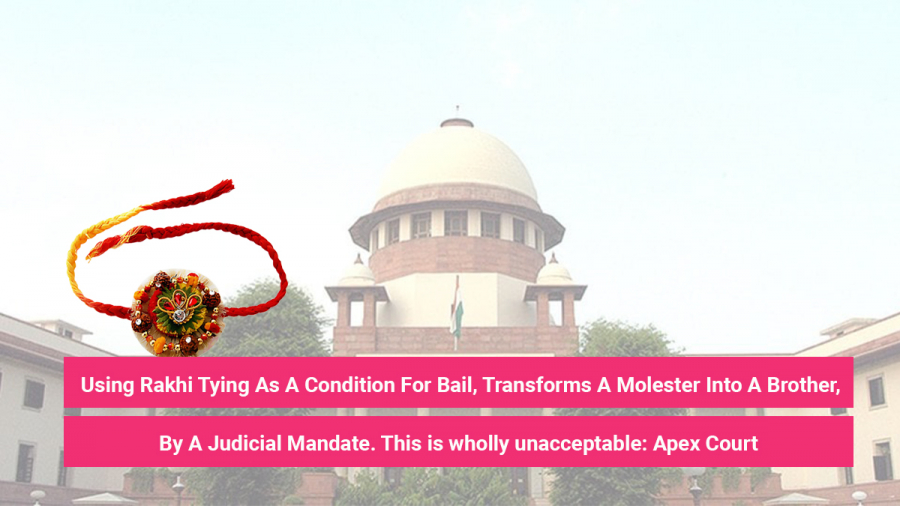In the matter of Aparna Bhat & Ors. v. State of Madhya Pradesh & Ors., the Supreme Court on 18th March 2021 condoned the use of reasoning/language by the courts which diminishes the offence and tends to trivialize the survivor and observed that “Using rakhi tying as a condition for bail, transforms a molester into a brother, by a judicial mandate. This is wholly unacceptable, and has the effect of diluting and eroding the offence of sexual harassment.”
The accused-applicant entered her house and caught hold of the complainant’s hand, and allegedly attempted to harass her sexually. The case was investigated, and a charge sheet was filed. The accused filed an application under Section 438 of Code of Criminal Procedure, 1973 (hereafter “CrPC”) seeking pre-arrest bail. The High Court, by the impugned order, even while granting bail to the applicant imposed tying rakhi as a condition of bail.
The appellants (Aparna Bhat & Ors) filed an appeal against the adverse precedent set by the imposition of certain bail conditions in a case involving a sexual offence against a woman and they impugn a part of the judgment of the Madhya Pradesh High Court that imposed these bail conditions. The appellants also filed an application seeking directions that all the High Courts and trial Courts be directed to refrain from making observations and imposing conditions in rape and sexual assault cases, at any stage of judicial proceedings, that trivialize the trauma undergone by survivors and adversely affect their dignity.
The Apex Court held that –
- This judgment is not as much about only the merits of the impugned conditions of the bail order, but is meant to address a wider canvas of (what appears to be) entrenched paternalistic and misogynistic attitudes that are regrettably reflected at times in judicial orders and judgments.
- The role of all courts is to make sure that the survivor can rely on their impartiality and neutrality, at every stage in a criminal proceeding, where she is the survivor and an aggrieved party….The current attitude regarding crimes against women typically is that “grave” offences like rape are not tolerable and offenders must be punished.
- Using rakhi tying as a condition for bail, transforms a molester into a brother, by a judicial mandate. The act perpetrated on the survivor constitutes an offence in law, and is not a minor transgression that can be remedied by way of an apology, rendering community service, tying a rakhi or presenting a gift to the survivor, or even promising to marry her, as the case may be.
- Judges can play a significant role in ridding the justice system of harmful stereotypes. They have an important responsibility to base their decisions on law and facts in evidence, and not engage in gender stereotyping.
- The use of reasoning/language which diminishes the offence and tends to trivialize the survivor, is especially to be avoided under all circumstances.
- Similarly, imposing conditions that implicitly tend to condone or diminish the harm caused by the accused and have the effect of potentially exposing the survivor to secondary trauma, such as mandating mediation processes in non-compoundable offences, mandating as part of bail conditions, community service (in a manner of speaking with the so-called reformative approach towards the perpetrator of sexual offence) or requiring tendering of apology once or repeatedly, or in any manner getting or being in touch with the survivor, is especially forbidden.
- The idea is that the greatest extent of sensitivity is to be displayed in the judicial approach, language and reasoning adopted by the judge.
- Having regard to the foregoing discussion, the Court directed that henceforth:
- Bail conditions should not mandate, require or permit contact between the accused and the victim. Such conditions should seek to protect the complainant from any further harassment by the accused;
- Where circumstances exist for the court to believe that there might be a potential threat of harassment of the victim, or upon apprehension expressed, after calling for reports from the police, the nature of protection shall be separately considered and appropriate order made, in addition to a direction to the accused not to make any contact with the victim;
- In all cases where bail is granted, the complainant should immediately be informed that the accused has been granted bail and copy of the bail order made over to him/her within two days;
- Bail conditions and orders should avoid reflecting stereotypical or patriarchal notions about women and their place in society, and must strictly be in accordance with the requirements of the Cr. PC. In other words, discussion about the dress, behavior, or past “conduct” or “morals” of the prosecutrix, should not enter the verdict granting bail;
- The courts while adjudicating cases involving gender related crimes, should not suggest or entertain any notions (or encourage any steps) towards compromises between the prosecutrix and the accused to get married, suggest or mandate mediation between the accused and the survivor, or any form of compromise as it is beyond their powers and jurisdiction;
- Sensitivity should be displayed at all times by judges, who should ensure that there is no traumatization of the prosecutrix, during the proceedings, or anything said during the arguments, and
- Judges especially should not use any words, spoken or written, that would undermine or shake the confidence of the survivor in the fairness or impartiality of the court.
- The Court requested the National Judicial Academy to devise, speedily, the necessary inputs which have to be made part of the training of young judges, as well as form part of judges’ continuing education with respect to gender sensitization, with adequate awareness programs regarding stereotyping and unconscious biases that can creep into judicial reasoning.
– Esha Shah, Paralegal
 Cart is empty
Cart is empty



